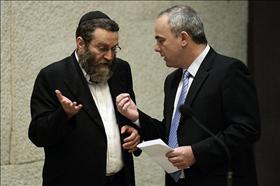State Budget Hijacked
Hiddush Reports: Additions for religious purposes to the national budget comes out to approximately NIS 1 billion per year
Hiddush- Freedom of Religion for Israel completed a comprehensive investigation focusing on internal changes to the national budget through the Knesset's Finance Committee. The report found that a disproportionate amount of funds for religious institutions were added onto the budget without any external supervision.
06/02/2013 18:50
Tags: Budget · Knesset Finance Committee · Moshe Gafni · UTJ

Finance Minister, Yuval Steinitz of Likud in a conversation with chairman of the Knesset's Financial Committee, Moshe Gafni of Degel Hatorah during voting on the Arrangements Law.15.07.2009. Photo: Abir Sultan, Flash 90
In 2010, 1.05 billion shekels (NIS) worth of allocations were added onto the budget, specifically for religious purposes, which is almost four times more than the budget of the Ministry of Religious Services in that same year. In 2011, the amount came close to NIS 850 million, of which NIS 140 million were categorized by the committee as "For Gafni Coalition Use," referring to the ultra-Orthodox United Torah Judaism member and Chair of the Knesset Finance Committee, Moshe Gafni. These additional allocations were not included in the budget originally approved by the Knesset, nor did they require approval from any government body besides the Finance Committee.
Throughout the fiscal year, the Knesset Finance Committee receives thousands of requests for fund transfers and budget additions. The Finance Committee can grant additional allocations to the budget based on requests without external approval. There has been a large amount of criticism surrounding the current system because each year the national budget comes out to be much larger than the Knesset-approved budget; there is very little supervision in approving who receives additional funding. In 2010 alone, NIS 328 million added onto the budget was categorized by the treasury as "Coalition Use," " Gafni Coalition Use," and "UTJ Coalition Use." In 2011, there was a decline in NIS 119 million in the allocations that were categorized under the any of the terms "Coalition Use."Shockingly, the amount of allocations that were categorized as "Gafni Coalition Use" jumped almost three times as much from NIS 46 million in 2010 to NIS 124 million in 2011.
"The Ministry of Finance at least did us a favor and categorized parts of the allocations under names like "Gafni Coalition" or "Shas coalition" so that we know exactly who plundered the public's piggy bank."
Hiddush President, Rabbi Uri Regev commented on the report, saying, "For the last 35 years, the Chairs of the Finance Committee, who traditionally come from an ultra-Orthodox party, have turned the Knesset Finance Committee into a personal ATM connected directly to the tax payer's pocket. A grotesque amount of funds are transferred without any real public supervision. For years, the Israeli government not only has let the ultra-Orthodox skim its budget, but continued to provide with more and more internal transfers. They have sold the future of the State to the ultra-Orthodox parties in exchange for obedient support in the coalition."
The additional budget allocations not only demonstrate the exorbitant amount of public money that is spent on religious programs, but also shed light on the incredibly inequitable distribution of funds between religious institutions and other state programs. The ultra-Orthodox Agudath Israel Independent Education system received additional funding that quadrupled the program's budget from NIS 32.5 Million in 2010 to 131.5M in 2011. Another ultra-Orthodox school system, Shas' "Spring of Torah Education," received an additional NIS 133 million in 2010 and NIS 101 million in 2011.
In comparison, the budget for The Service for Girls' Treatment, a state-funded program for at-risk young women, only had a total budget of NIS 23 million in 2010, including only NIS 14 million to support shelters for girls in distress. The state budget allocated less than NIS 0.5 million in support for the Center for Victims of Sexual Abuse and less than NIS 2 million for support for rape victims. Around NIS 4 million was allocated to the Shelter for Victims of Human Trafficking. All of these allocations to social welfare programs add up to NIS 35 million. How does that compare to the NIS 826 million that MK Gafni allocated to religious institutions in the same year?
The Ministry for Science, Culture and Sport received only NIS 13 million for science research and grants and only NIS 31million for scientific infrastructures. To put this into a larger context, the entire national budget for culture in 2010 amounted to NIS 574 million, barely more than half of the "post-budgetary-transfers" facilitated by Gafni for religious programs that year. The entire national budget for sports that year was 81.5M. When looking at MK Gafni's role in distributing additional funds through the Knesset Finance Committee, it is clear how damaging the unholy alliance between religion and state is to Israel's economy and the social and cultural programs that make up Israel's civil infrastructure.
Rabbi Regev appropriately pointed out that, "The Ministry of Finance at least did us a favor and categorized parts of the allocations under names like "Gafni Coalition" or "Shas coalition" so that we know exactly who plundered the public's piggy bank. In the last elections, the public has spoken and called for a Civil Zionist government. We must expect that Yair Lapid and Avigdor Lieberman will stand by their word and insist that the next chair of the Knesset Finance Committee will not be a sectarian politician. We need to free the Finance Committee from its imprisonment and now is the perfect opportunity to do so. "
The numbers speak for themselves. MK Moshe Gafni's role as Chair of the Knesset Finance Committee has shown the dangers of religious over-involvement in politics. Hiddush is committed to promoting accountability and transparency in the country's financial decisions and we are working to ensure that the struggle for religious freedom and equality will continue to make headway amongst Knesset lawmakers and committees in the next government term.